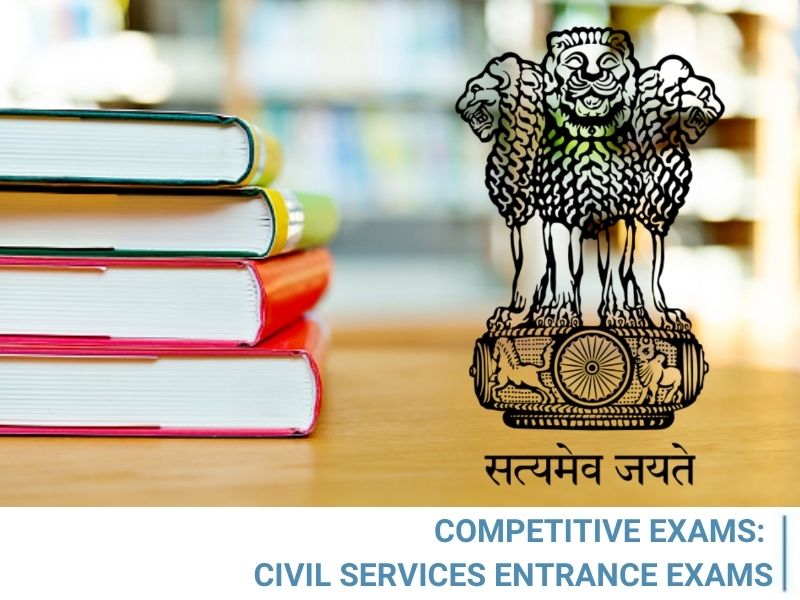Civil Services Examinations or ‘CSE’, also called UPSC examinations, is a national competitive examination in India to recruit applicants into civil services for the government of India, such as the Indian Administrative Service (IAS), Indian Police Service (IPS), Indian Revenue Service (IRS), Indian Foreign Service (IFS), etc.
Conducted by the Union Public Service Commission of India (UPSC), the nationwide examination is conducted in three stages or phases: prelims, mains and the personality test.
Website: https://www.upsc.gov.in/
Eligibility:
Age: Applicants between the age of 21 and 32 years are allowed to appear for the examination (general categories). In the case of reserved categories, the age limit is increased to 35 for OBC, 37 for SC/ST/PWD and 40 years for disabled defense services personnel.
Nationality: Candidates applying for IAS, IFS and IPS must be holders of Indian citizenship. Candidates applying for other services may be a citizen of India, Bhutan, Nepal or a person of Indian origin migrating from foreign countries with an intention to settle in India.
Education: Applicants have to have a minimum educational qualification of a degree from a central/state/deemed/open university; degrees conferred through correspondence and distance education are also accepted.
Number of attempts: General category candidates are allowed to appear for UPSC examinations for a total of six attempts. OBC candidates may appear nine times, and SC/ST candidates are allowed unlimited attempts till they attain 37 years of age.
Exam Pattern:
UPSC CSE is conducted in three phases:
1. UPSC CSPE – the preliminary objective-type examination.
Total marks- 400
The preliminary exam is objective type and consists of two papers (each carrying 200 marks) with MCQ questions to be completed in two hours.
- Paper I is a general studies paper carrying 100 questions with negative marking and tests candidates’ general knowledge on current affairs, history, economics, art and culture, etc.
- Paper II is an aptitude test (called CSAT) carrying 80 questions with a negative marking which test the candidate’s skills in comprehension, interperson skills, analytical and logical ability, problem-solving, data interpretation, basic numeracy, etc.
2. UPSC CSME – the main descriptive-type exam.
Total marks- 1750.
The main exam consists of nine descriptive-type papers of three hours duration each, ctesting the candidate’s skills in communication, comprehension, analytical and logical ability, problem-solving, data interpretation etc. The papers are as follows:
Qualifying papers (paper A and B):
- Paper A (300 marks) – One of the Indian languages (23 options as listed in the Eighth Schedule to the Constitution of India) to be selected by the candidate
- Paper B (300 marks) – English
- Paper I (250 marks) – Essay type paper
- Paper II (250 marks) – General Studies I (Indian heritage and culture, history and geography of the world and society)
- Paper III (250 marks) – General Studies II (Governance, constitution, polity, social justice and international relations)
- Paper IV (250 marks) – General Studies III (Technology, economic development, biodiversity, environment, security and disaster management)
- Paper V (250 marks) – General Studies IV (ethics, integrity and aptitude)
- Papers VI, VII (250 marks each)- Two papers to be selected by the candidate from the list of 27 optional subjects including Agriculture, Geography, Law, History, Literature, Statistics, Sociology, etc.
3. Interview/personality test. Total marks- 275
The interview or personality test carries 275 marks and is the final round of the civil service examinations. Candidates qualifying for the mains cut-offs are eligible to appear for the interview round. Candidates are evaluated by a board of observers on their mental caliber, leadership, moral integrity, balance of judgement etc.
Dates:
Registrations: completed for 2021.
UPSC Prelims: completed on October 10, 2021. Results to be released in October.
UPSC Main Exams: January 7-16, 2022. To be conducted offline. Results to be released in March/April.
UPSC Interviews: Scheduled to be conducted in May 2022. Results to be released in May/June.
List of services applicable after qualifying the examination:
All India Services
- IAS – Indian Administrative Service
- IPS – Indian Police Service
Central Services (Group A)
- IFS – Indian Foreign Service
- IA&AS – Indian Audit and Accounts Service
- ICAS – Indian Civil Accounts Service
- ICLS – Indian Corporate Law Service
- IDAS – Indian Defence Accounts Service
- IDES – Indian Defence Estates Service
- IIS – Indian Information Service
- ITS – Indian Telecommunication Service
- IOFS – Indian Ordnance Factories Service
- IPoS – Indian Postal Service
- IP&TAFS – Indian P&T Accounts and Finance Service
- IRAS – Indian Railway Accounts Service
- IRPS – Indian Railway Personnel Service
- IRPFS – Indian Railway Protection Force Service
- IRTS – Indian Railway Traffic Service
- IRS-IT – Indian Revenue Service
- IRS-C&CE – Indian Revenue Service
- ITrS – Indian Trade Service
Group B Services
- AFHCS – Armed Forces Headquarters Civil Services
- DANICS – Delhi, Andaman and Nicobar Islands Civil Service
- DANIPS – Delhi, Andaman and Nicobar Islands Police Service
- PCS – Pondicherry Civil Service
- PPS – Pondicherry Police Service
Contact details:
Union Public Service Commission
Shahjahan Road, New Delhi – 110069
Phone: +91 1123098543
Email: feedback-upsc@gov.in
Also read:
